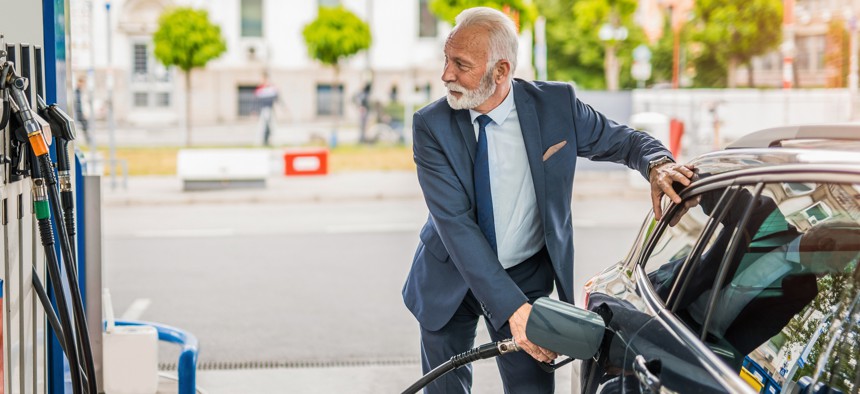Support Slips for Phase Out of Gas-Powered Cars and Trucks

DjelicS via Getty Images
A slight but rising majority of Americans are against a transition towards manufacturing only zero-emission vehicles, a new survey finds.
A growing number of Americans are against phasing out gas-powered vehicles and believe stricter environmental rules are not worth the economic cost they may have, according to a recent report.
Pew Research Center recently surveyed 10,282 U.S. adults about policies to address climate change. Among the findings: 55% of Americans oppose the idea of phasing out the production of trucks and cars with internal combustion engines by 2035. That figure is up slightly from last year, when 51% of Americans opposed the concept.
Even so, policymakers in some states are already taking steps to transition away from gas-powered vehicles. In 2020, California Gov. Gavin Newsom issued an executive order calling for all passenger cars and trucks sold in California to be zero-emission by 2035. In March, Washington set the same goal for 2030. At the federal level, the Biden administration last year proposed regulations for emissions standards so that half of cars and vehicles sold would be electric by 2030.
Pew Research conducted its survey in early May, with the results highlighted in a report published last week.
While the majority of Americans are not inclined to say goodbye to gas-powered vehicles any time soon, a significant share, 42%, said they would be very or somewhat likely to consider going electric when it comes time to purchase their next vehicle. Among those respondents, helping the environment and saving money on gas were the top reasons cited for their interest.
The survey also found that willingness to consider buying an EV was higher among certain groups, including: current hybrid or electric vehicle owners (68%), those between the ages of 18 and 29 ( 55%), and people who live in urban areas (53%).
People older than 50, as well as those living in rural areas, are among the most skeptical when it comes to considering a future electric vehicle purchase, the survey shows.
Overall, 67% of Americans said they would support incentives to encourage the use of hybrid and electric vehicles.
Growing Opposition to Stricter Environmental Laws
A slight majority, 53%, of Americans said they believe stricter environmental laws would be worth the cost of lost jobs or other hits to the economy, but a growing share said the opposite. Forty-five percent of survey participants said stricter laws would not be worth the economic toll, up from 33% in 2019.
The increase is bipartisan but more significant among Republicans. Seventy-five percent of GOP respondents said stricter environmental laws and regulations are too costly for the economy, up from 55% in 2019. Meanwhile, 21% of Democrats agreed, up from 14% in 2019.
Areas of Agreement
Ninety percent of Americans said they were in favor of planting a trillion trees to absorb carbon emissions and 79% favored providing a tax credit to encourage businesses to develop carbon-capturing and -storing technologies. Both of these policies have broad bipartisan support, according to the report.
Furthermore, 68% of Americans favor taxing corporations based on their emissions, and 72% of respondents said they support requiring power companies to use more energy from renewable sources.
Other Findings
A majority of Americans feel the federal government isn’t doing enough to protect water and air quality, or to mitigate the effects of climate change.
Black and Hispanic respondents are more likely than their white counterparts to report air pollution, concerns about drinking water, or a lack of green spaces in their communities.
Environmental problems are also more likely to be reported in low-income communities than in middle- and upper-income areas. Fifty-eight percent of low-income Americans said safe drinking water is at least a moderate concern in their local community, compared with 37% of middle-income and 25% of upper-income respondents.
The survey also found that 71% of Americans experienced at least one of five extreme forms of weather last year, such as floods or intense storms, long periods of unusually hot weather, droughts or water shortages, major wildfires, or rising sea levels that erode shorelines. Most respondents who said they had experienced one of those events said they believed climate change to be a factor.
To read the full report, click here.
Molly Bolan is an assistant editor for Route Fifty.
NEXT STORY: Ratings Tool Helps Counties Assess Security Risks






